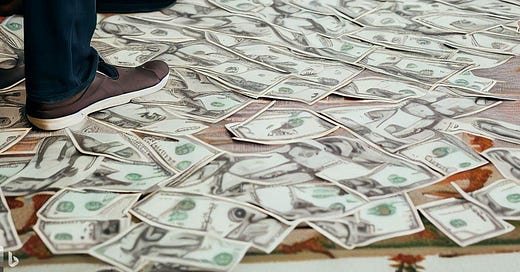Money began its life as a ‘training’ technology, not the ‘trading’ technology most of us assume.
In order for money to have some value, you have to teach people to want it, and nothing kicks that process off as well as “taxes, backed by the threat of violence”.
But that’s not all, because, in order for money to perform its beneficial magic—opportunity, risk, motivation, ease—it also needs motion.
So, once you’ve got the tax:violence apparatus in place, you can get the money supply swirling around by linking it to social or individual goods, class, or via political maneuvers—or a bit of all three.
If taxing and violence are the roles of the state, motion is mostly the role of the market1. But the market is just a framework—it needs a bit of guidance sometimes. So, taxes have to be more than just a threat; they need to play a part in why and how we work, and what we own, buy, and do:
I have some, apparently ‘unconventional’, ideas about how taxes should apply more heavily to stuff that just sits around for the exclusive benefit of a tiny minority, and less heavily on the labour that moves humanity forward, or the basic needs that naturally are more of a relative burden for the poor… But, you know, I’m pretty weird.
Anyway, the point is, as a collective, we’ve reached a point where money has value and is a handy tool for human progress.
Now we need to start asking ourselves: How should we allocate this value and opportunity?
And this is where the wheels start to come off, because this is where we find we need to start pricing human endeavour. Only we’re not really capable of valuing a single human life, amongst all its diversity and interrelationship. So we just say “Screw it!” and give the job to wealth.
But, even though we tried real hard everyone has got an opinion, especially if the possibility of first-class travel depends on it!
The obvious problem with any discussion about the allocation of wealth is, the people who have it are unlikely to ever find much upside in giving it up. Or, if they do, they’d prefer for it to happen in ways that they have pretty granular control over. The net result is lots of toy-throwing and misinformation, even in the most democratic of places.
So, all this means, it behoves us to know a bit more about how money actually works—without the biased opinions—right?
There’s been a bit of talk recently, here in Aotearoa, about the need for ‘financial literacy’ education in schools. Honestly, I think it’s largely bullshit, because teaching a kid about compounding interest rates is not going to help them much if they’re in a mouldy rental property on the poverty line, or if they are paying off thousands in student loans with their ‘gig economy’ employment. Basically, I expect most typical financial literacy education teaches upper-middle class and wealthy kids how not to completely blow their trust funds.
That’s cynical-me again. I guess financial literacy is fine, provided it isn’t just an extra social-good burden on our overworked teachers. It’s just no financial literacy course will ever talk about the physics of wealth, and the ways that wealth corrupts our idea of fairness and meritocracy.
Money requires trust to function. In fact, among us plebs, that’s all money is. As regular citizens, we have no real say over how the value of money is created through taxation and creating new dollars, so we simply have to trust the burger joint will accept our $20 note, and trust the government will keep taxing them in dollars, so they don’t decide to shift their entire operation to Bitcoin and leave us un-burger-fulfilled.
Because we operate at this sort of ‘micro’ level, the reality of our economic systems tend to be pretty opaque to most of us.
The thing is though, we are barrelling toward some pretty worrying outcomes, with all our social division and ecological threats, and the reality is money solves big, unpredictable problems largely via the “hopes and dreams” factory: If your ‘plan’ to solve existential crises is to hope someone will just dream up a way to make good stuff more profitable than bad stuff, you might be heading for a fall.
Which begs the question of whether an economic system, built to be a completely neutral arbiter over human choice, is fit for modern problems?
Have we perhaps overestimated just how naturally community-minded and altruistic the human species overall is?
After all, one thing we didn’t predict was how intensely-protective and innovative people are once they have stuff.
All of this is pretty disheartening, so I wanted to round out the series with a couple of more hopeful ideas about what a world of dignity and common purpose might actually look like.
That starts with changing what defines the heroes and villains in the story of progress.
And, I wanted to end with a reminder that we actually know what to do.
The status quo is a powerful drug: There’s no doubt it can protect you from new disappointment. But, nothing lasts forever—regardless of whether you agitate or participate in the change or not. So we, collectively, one way or another have to choose who gets to decide our narrative.
I genuinely hope you’ve enjoyed this series; I’ve enjoyed releasing it from my brain!
This won’t be the last you hear about wealth from me, but I’ve got other topics to shout about in the meantime.
If you’re not already, mash the subscribe button and, better yet, share my newsletter and let’s make this a thing!
-T
I mean, that’s a pretty simplistic take, but I’m trying to keep some “crowding out” libertarians in my subscriptions so I can slowly turn them leftward.


















Well, clearly a lot of work behind the scenes here.
I just connected to a friend, Tony Pomfret (also in Dunedin, NZ — I'm looking forward to his first post), and noticed that he follows your stack. So I took that as a recommendation.
I've only read this one post so far, and there's a lot here. Linking to your previous posts the way you have is very effective. I've discovered that, normally, links in one post to another post don't open in a new window, which is an unfortunate inconsistency.